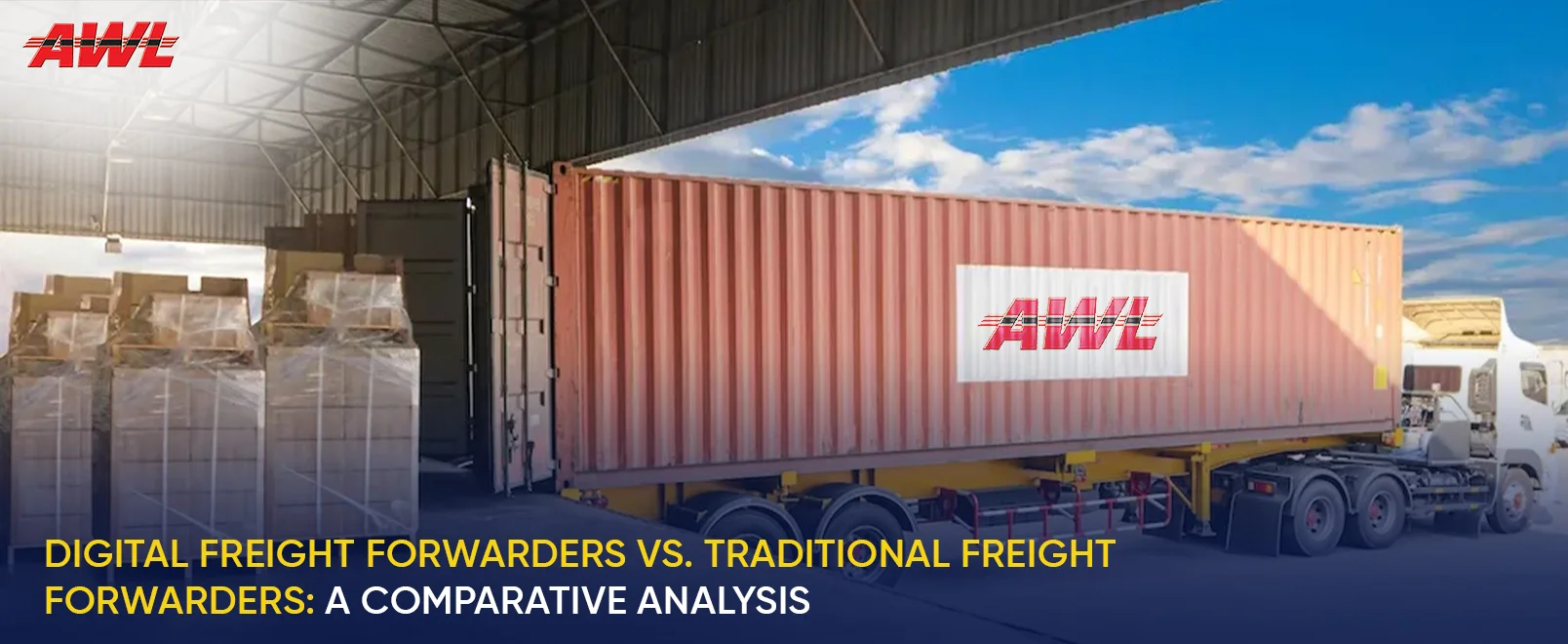
Digital Freight Forwarders vs. Traditional Freight Forwarders: A Comparative Analysis
17 February 2025

The logistics industry has undergone a major transformation with the rise of Digital Freight Forwarders. Traditionally, freight forwarding relied on manual processes, paperwork, and extensive human coordination. However, digitalization has revolutionized the way goods are shipped across borders. Businesses today have the option to choose between traditional freight forwarders and tech-driven digital freight forwarding companies.
At AWL India, we understand the importance of efficient freight forwarding solutions for global trade. As one of India's leading logistics and freight forwarding service providers, we integrate technology to enhance logistics operations. This blog explores the differences between digital freight forwarders and traditional freight forwarding services, helping businesses make informed decisions.
What Are Freight Forwarders?
Freight forwarders are intermediaries between shippers and transportation services, ensuring the smooth movement of goods across national and international borders. They handle tasks such as customs clearance, cargo booking, warehousing, and documentation.
There are two main types of freight forwarders:
1. Traditional Freight Forwarders: Operate through manual coordination, phone calls, emails, and extensive paperwork.
2. Digital Freight Forwarders: Utilize technology-driven platforms to automate and streamline logistics processes.
While both types aim to facilitate efficient shipping, their approach, efficiency, and cost-effectiveness vary significantly.
Traditional Freight Forwarders: Strengths & Challenges
Strengths of Traditional Freight Forwarders
Despite the rise of digital freight forwarders, traditional freight forwarding companies still hold relevance in the logistics industry. Their key strengths include:
- Industry Expertise: Traditional freight forwarders have extensive knowledge of customs regulations, trade compliance, and industry practices.
- Personalized Service: Many businesses prefer a hands-on approach where they can directly communicate with freight forwarding companies.
- Strong Global Networks: Established freight forwarding companies have long-standing relationships with shipping lines, airlines, and transport providers.
Challenges of Traditional Freight Forwarders
However, the manual nature of traditional freight forwarding presents certain drawbacks:
- Slow and Inefficient Processes: Manual documentation and phone-based coordination slow down operations.
- Lack of Transparency: Limited real-time tracking makes it difficult for businesses to monitor shipments.
- Higher Costs: Increased reliance on manual labor leads to higher operational expenses.
- Prone to Errors: Paper-based processes increase the risk of documentation mistakes, delays, and financial losses.
Digital Freight Forwarders: The Future of Logistics
Digital Freight Forwarders leverage technology such as AI, IoT, and cloud computing to optimize logistics operations. These companies provide real-time shipment tracking, instant pricing, and automated documentation.
Advantages of Digital Freight Forwarders
The emergence of digital freight forwarding companies offers several advantages over traditional freight forwarding services:
- Enhanced Transparency: Businesses can track their shipments in real-time through online dashboards.
- Automated Documentation: AI-powered systems handle customs paperwork and compliance checks efficiently.
- Cost Savings: Automated systems reduce overhead costs, making shipping more affordable.
- Faster Shipping: Digital platforms enable instant booking, eliminating delays caused by manual coordination.
- Improved Scalability: Companies can easily expand their operations with tech-driven logistics solutions.
Challenges of Digital Freight Forwarders
Despite their advantages, digital freight forwarders also face some limitations:
- Limited Human Interaction: Some businesses prefer personalized customer support, which digital platforms may lack.
- Reliability Concerns: Businesses with complex logistics needs may require hybrid solutions that combine digital efficiency with human expertise.
- Integration Issues: Some companies may face challenges integrating digital freight forwarding solutions with their existing supply chain systems.
Key Differences Between Digital & Traditional Freight Forwarders
| Feature | Traditional Freight Forwarders | Digital Freight Forwarders |
| Communication | Phone calls, emails, and manual coordination | Online platforms, automated communication |
| Tracking & Visibility | Limited real-time tracking | Real-time shipment tracking with live updates |
| Documentation | Paper-based customs and freight documents | Automated digital documentation |
| Cost | Higher due to manual processes | Lower due to automation |
| Speed & Efficiency | Slower, with potential delays | Faster processing and instant booking |
| Customer Support | Personalized service through human interaction | AI-driven support with minimal human involvement |
Businesses must evaluate these differences to determine which freight forwarder service best suits their logistics needs.
How AWL India Bridges the Gap
At AWL India, we recognize the advantages of both digital freight forwarders and traditional freight forwarding services. Our approach combines the best of both worlds to offer businesses:
- Seamless Digital Tracking: We provide real-time shipment tracking for better transparency.
- Personalized Support: Our logistics experts ensure that businesses receive tailored solutions.
- Automated Documentation: We streamline customs clearance and compliance to prevent delays.
- Pan India Logistics Services: We offer international freight forwarding services and domestic freight solutions across India.
By integrating cutting-edge technology with human expertise, AWL India is redefining logistics and freight forwarding in India.
Which Freight Forwarding Solution Should You Choose?
When choosing between digital freight forwarders and traditional freight forwarding companies, consider:
- Shipment Volume & Frequency: Businesses with high-volume shipments may benefit from digital automation.
- Budget & Cost Efficiency: Digital solutions are more cost-effective, but traditional freight forwarding offers personalized service.
- Technology Adoption: Companies with existing digital infrastructure can easily integrate digital freight forwarding services.
- Global Logistics Needs: Businesses with international trade may require hybrid solutions combining digital efficiency with expert human guidance.
For businesses in India seeking freight forwarder service solutions, AWL India provides customized logistics strategies that optimize supply chain efficiency.
Conclusion: The Future of Freight Forwarding
The logistics industry is rapidly evolving, and the competition between digital freight forwarders and traditional freight forwarding companies continues to shape the market. While digital solutions offer automation, transparency, and cost savings, traditional freight forwarding provides personalized expertise and strong industry networks.
At AWL India, we are committed to offering the best of both worlds. As one of India's leading freight forwarding companies, we leverage technology while maintaining personalized customer service to ensure seamless logistics solutions. Whether businesses require international freight forwarding services or domestic freight forwarding, our integrated approach ensures efficiency, reliability, and cost savings.
The future of logistics and freight forwarding is digital, and at AWL India, we are at the forefront of this transformation

John Smith
Digital Tech Head